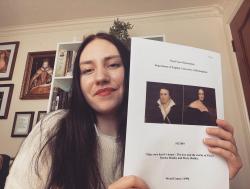
Culture Writer Chloe Melvin provides a new reader’s guide to poetry, from collections to podcasts and poetry reading guides
In 2023, poetry is no longer for the wealthy upper echelons of society — it is for us all.
The most common appeal for recommendations that I get as a student of English Literature is ‘How do I get into poetry?’. This question can sometimes feel daunting to its receiver – it is a bit like asking how one gets into eating. But I understand the subtext of what they are asking — how do I get into an art form that is hundreds of years old, written in such an unfamiliar way to the untrained eye, and that seems so elitist to the average reader?
Here are four steps for you to follow on your poetic journey. I hope that some of these tips will help you to feel more knowledgeable and confident as you become a poetic reader and critic. Feel free to go through them at your own pace.
1. Read a Poetry Collection
My first tip when a new poetry reader asks me for a recommendation is to check out a poetry collection. Our tastes in poets can be so subjective— you may prefer medieval poets such as Chaucer, the longer Victorian forms of Lord Alfred Tennyson, or even the short ‘Instagram Poetry’ of Rupi Kaur. It is so difficult to know which styles or themes of poetry will speak to you as an individual before you discover them. My advice is to pick up a copy of a poetry collection containing a varied range of poets – from medieval to modern– and read them over, seeing which poets resonate with you. An edition that I have been loving is Penguin’s Poems by Heart (2009) — a collection of poetry’s brightest which will not disappoint.
“Poetry is no longer for the wealthy upper echelons of society — it is for us all
Don’t feel ashamed about not having any prior knowledge of some of history’s loftier and most respected poets. Before starting university, I had never read any of Percy Bysshe Shelley’s work – now I am writing my MA thesis on his poetry. Everyone has to start somewhere, and you might just as well start with something that you love.
2. Listen to a Literature Podcast
This one sounds drier than it is, but there are some absolutely brilliant podcasts that are both suitable for poetry novices and also enlightening and well-informed. One example of this is a podcast I listen to religiously – Frank Skinner’s Poetry Podcast. Skinner takes poets (old and new) and examines their work stanza-by-stanza, revealing the richness and beauty that each poem has to offer both in their language and their forms. While he covers some old favourites, such as Milton, Pope, and Keats, Skinner’s podcast is a great opportunity to discover the works of more modern poets that you might not ordinarily come across.
For some podcasts which involve academics analysing poets, I also recommend BBC’s In Our Time and The History of Literature, for when you are feeling more adventurous in your poetic criticism.
3. Read a Book About Poetry
A great source of knowledge when you are a beginner and are not sure how to articulate your poetic criticism into a formed opinion (or even if you cannot fathom how critics are getting so much from so little) is to see the process of criticism modelled before you. If you’re not an English student and cannot attend poetry lectures, a great alternative is Frank Skinner’s book How to Enjoy Poetry, in which he guides you through his analysis from his first impressions to his final thoughts – including the stanzas of the poem alongside – to demonstrate how rich a single poem can actually be.

Another great and inspired example of a book to guide you is The Cambridge Guide to Reading Poetry (2021), written by my thesis supervisor Dr Andrew Hodgson. He writes sympathetically on the difficulty of poetic analysis, stating that ‘The most important thing, to begin with, is to rid ourselves of the suspicion that we don’t understand poetry and to welcome the awareness that understanding is gradual, may well take place slowly, and may evolve endlessly.’ This book will encourage you to consolidate your thoughts about poetry while also inviting you to question why certain poems evoke particular feelings within you, and it provides a helpful framework to assist you in organising your own criticism into written work, if you so wish.
“Remember that you deserve to enjoy any poetry that you desire
4. Enjoy Yourself— Without Being Self-Conscious
My final piece of advice to you is this: remember that you deserve to enjoy any poetry that you desire, no matter your social or educational background. I began my poetry journey as the child of working-class parents living on a council estate, and I continue it as a master’s student. It has taken me through difficult times, through love and loss, and it takes me through writing this article for you right now. Poetry is an emotional crutch to lean on during hard times, a guiding light through trouble, and a celebration of our best moments.
Enjoyed this? Read more from Redbrick Culture here:

Comments